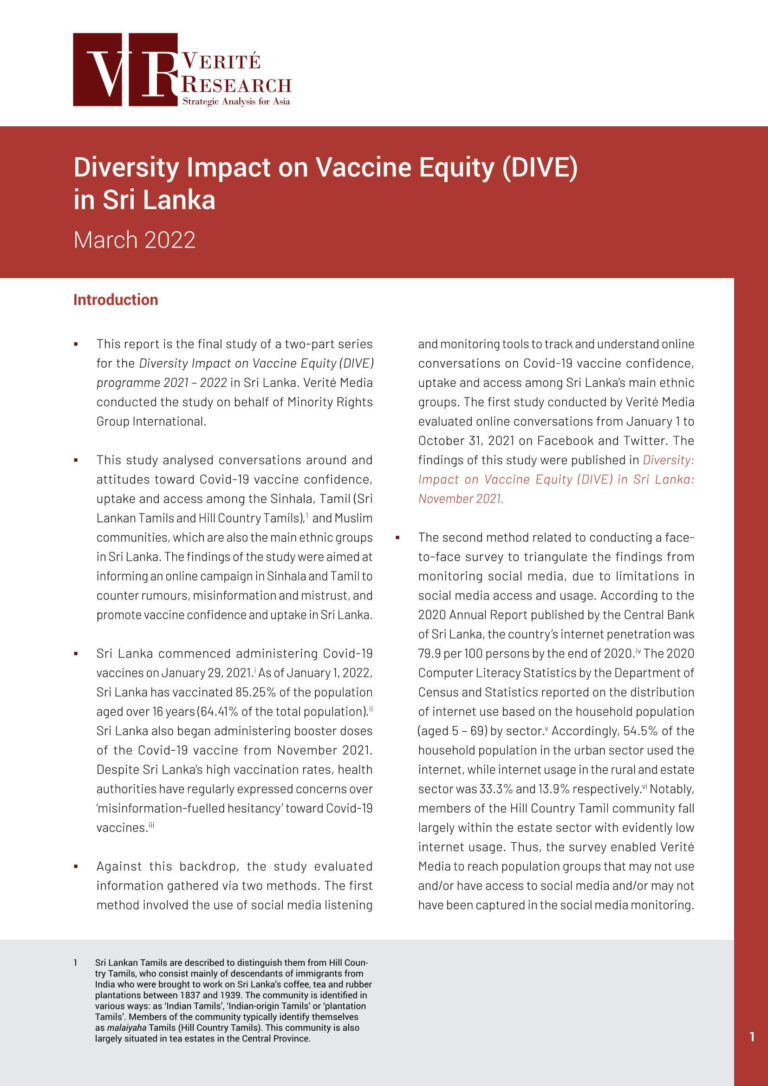
Diversity Impact on Vaccine Equity (DIVE) in Sri Lanka: March 2022
Covid-19 has shed light on ongoing disparities in vaccine access and confidence among different ethnic groups worldwide. Against this backdrop, Verité Media conducted a two-part study on the impact of ethnicity on Covid-19 vaccine confidence, uptake and access among the Sinhala, Tamil and Muslim communities in Sri Lanka. The study was conducted together with Minority Rights Group International as part of the Diversity Impact on Vaccine Equity (DIVE) programme 2021 – 2022. This report is the second and final part of the two-part study.
The first report published by Verité Media analysed social media conversations on Covid-19 vaccine confidence, uptake and access in Sri Lanka from January 1 to October 31, 2021. The findings of this report were published in Diversity: Impact on Vaccine Equity (DIVE) in Sri Lanka: November 2021. This second report summarises the main observations from conducting a face-to-face survey on Covid-19 vaccine confidence, uptake and access among different ethnic groups in Sri Lanka. The survey was conducted to triangulate the findings from the first report on analysing social media conversations. It was carried out from December 16, 2021 to January 1, 2022 among 2,476 respondents from 22 districts in Sri Lanka. This report highlights 10 key findings from the survey that relate to Covid-19 vaccine confidence, uptake and misinformation, as well as confidence in the authorities who were involved in the administration and distribution of Covid-19 vaccines in Sri Lanka.
This report also details the online campaign that Verité Media conducted to counter misinformation and mistrust in the Covid-19 vaccine in Sri Lanka. The campaign strategy was based on the findings extracted from monitoring social media conversations and the face-to-face survey. The campaign also sought to promote vaccine confidence and uptake among groups that showed hesitancy in relation to obtaining the Covid-19 vaccine.
As such, Sri Lanka can significantly improve the competitiveness of its exporters by reducing processing times at the border. A proven method in this regard is the use of Electronic Document (e-document) processing platforms for trade. Currently in Sri Lanka, the benefit of this particular opportunity is being hobbled by the non-acceptance of electronic signatures (e-signatures) despite most of the prerequisites and systems being in place.
This policy note sets out the main findings of a study conducted by Verité Research on the non-acceptance of e-signatures in Sri Lanka.
Verité Research, as the name implies, is an independent think tank with research at its core. We carry out this research along four areas –economics, politics, media, and law. Leveraging this research, we provide strategic analysis and advice to governments, organisations, and the private sector in Sri Lanka and beyond.

